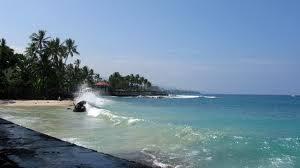Maritime securityCoast Guards blocks Hawaii bay to protect president
The Coast Guard has established a security zone in the waters of Kailua Bay to protect the president on his family during their holiday vacation; unauthorized people entering the zones are subject to penalty of $40,000 for each violation or a criminal penalty resulting in imprisonment of twenty-five years; the exclusion zone will be in effect until 7 January

U.S. Coast Guard has cordoned off Kailua Bay during the president's stay // Source: blogspot.com
Coast Guard law enforcement officers are enforcing a temporary security zone in the waters of Kailua Bay, Hawaii. The temporary security zone has been established to ensure the safety of President Barack Obama and his family during their holiday vacation.
The security zone went into effect 2 p.m. 23 December and runs through 8 p.m. 7 January, unless canceled earlier by the Coast Guard Captain of the Port Honolulu, Capt. Joanna Nunan.
The Coast Guard is coordinating with the Honolulu Police Department, Marine Corps Base Hawaii, and other federal, state, and county law enforcement agencies on patrols of the area under the direction of the U.S. Secret Service.
The maritime security zone includes a portion of Kailua Bay, beginning at Kapoho Point and extending westward to the shoreline at Namala Place road, near the Castles surf spot.
The zone also includes the adjacent channel beginning near Kapoho Point to a point extending the channel way to approximately 150 yards south of the North Kalaheo Avenue Road Bridge.
An orange “boom” and yellow buoys have been placed on the water and in the channel for visual references of the zone.
Under the U.S. Code of Federal Regulations (33 CFR 165.33), the temporary law prohibits any unauthorized person or vessel from entering or remaining in this security zone. Any person entering the zone without the permission of the U.S. Coast Guard Captain of the Port is subject to a penalty of not more than $40,000 for each violation or a criminal penalty resulting in imprisonment of not more than twenty-five years, and a fine of not more than $250,000.
Offending vessels may also be seized and held liable for any monetary assessments.
“Recognizing the zone may inconvenience residents and recreational users,” said LCDR Scott Whaley, “we have coordinated closely with the local community to minimize the impact and still meet the security requirements for the President of the Unites States during his stay on Oahu.”
